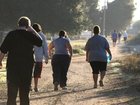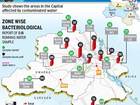A new treatment for obesity that combines two existing drugs resulted in twice as much weight loss as the only approved long-term anti-obesity medication, according to a study released Monday.
A mix of Phentermine and topiramate, sold under the brand name of Topamax, was shown in clinical trials to be twice as effective as orlistat, which is commercialized in some countries as Xenical or Alli, it said.
 Full Story
Full Story
About one in 10 cancers in men and one in 33 in women in western European countries are caused by current and past alcohol consumption, according to a study released Friday.
For some types of cancer, the rates are significantly higher, it said.
 Full Story
Full Story
Being exposed to highway pollution can cause brain damage in mice akin to memory loss and Alzheimer's disease, U.S. researchers said Thursday.
Scientists recreated the airborne pollutants that come from the burning of fossil fuels and the weathering of car parts and pavement, and exposed mice to the harsh air for 15 hours per week over 10 weeks.
 Full Story
Full Story
Urgent global action is needed to prevent the spread of a multi-drug-resistant "superbug" after it was found in water supplies in the Indian capital, doctors said in research published Thursday.
The study in The Lancet medical journal said that New Delhi metallo-beta-lactamase 1 (NDM-1) producing bacteria were found in 51 out of 171 samples taken from water pools and rivulets and two out of 50 tap water samples in the city.
 Full Story
Full Story
The discovery of radiation in seafood has hit Japan right in its culinary heart, as the nation that brought sushi to the world contemplates having to change thousand-year-old eating habits.
For an archipelago that has lived off the ocean since prehistoric times, radioactive fish is a worst-case scenario with possibly economy-wide implications.
 Full Story
Full Story
Meditation can deliver powerful pain-relieving effects to the brain with even just 80 minutes' training for a beginner in an exercise called focused attention, a study released Tuesday found.
"This is the first study to show that only a little over an hour of meditation training can dramatically reduce both the experience of pain and pain-related brain activation," said Fadel Zeidan, lead author of the study and a post-doctoral research fellow at Wake Forest Baptist Medical Center in North Carolina.
 Full Story
Full Story
Doctors debated the merits of bypass surgery to solve heart problems during a major cardiology conference on Monday, as studies suggested angioplasty and medication could be safe alternatives.
One study by South Korean researchers found similar survival rates among people who had balloon angioplasty, a less invasive technique for opening the arteries, and among patients who underwent open heart surgery for serious coronary disease.
 Full Story
Full Story
Japan imposed a legal limit Tuesday for radioactive iodine in fish, as the operator of the stricken Fukushima nuclear plant pumped toxic water into the Pacific Ocean for a second day.
The government also said it would look at widening its testing to cover a larger area after raised levels of radioactive iodine were discovered in a small fish caught off Ibaraki prefecture, south of the plant.
 Full Story
Full Story
Sunday as a major breakthrough that could eliminate the need for open heart surgery in some patients, U.S. doctors said Sunday.
The method is aimed at high-risk patients who suffer from severe aortic stenosis, a clogged valve that impedes the pathway of oxygen-rich blood by making the heart work harder to pump blood through a narrowing opening.
 Full Story
Full Story
For a man whose view of the world has slowly faded to black over 30 years, a device that allows him to see flashes of light has enkindled his hope of one day gazing upon his grandson's face.
A career electrician who grew up in Greece and came to the United States as a young man, Elias Konstantopoulos first noticed his vision getting poorer when at age 43 he absentmindedly tried on a relative's eyeglasses and found he could see more clearly with them than without.
 Full Story
Full Story



